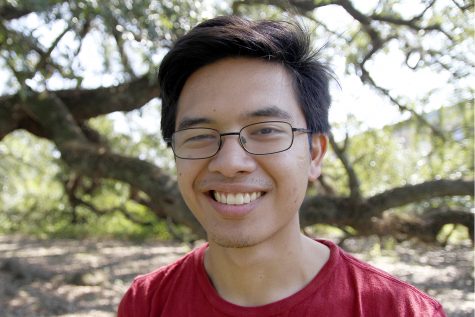
Director of Graduate Studies and Institutional Effectiveness Dr. John Boulahanis coordinates the graduate studies program as well as between the administration and academic departments in his new position. Zachary Araki/The Lion's Roar
Director of Graduate Studies and Institutional Effectiveness Dr. John Boulahanis hopes for the combined position to be a centralized resource for students, academic departments and support units.
According to Boulahanis, the two positions work well together.
“Our graduate programs are very strong,” said Boulahanis. “It’s really important that we are able to measure whether or not programs are meeting their goals and objectives and to force the faculty to reflect and to ask questions like, ‘When are they learning things in the curriculum?’ and ‘Are we measuring what we really want to measure?’”
Provost Dr. Tena Golding explained why Boulahanis was chosen for the position.
“Dr. Boulahanis has been director of graduate studies for many years and has done an excellent job,” said Golding. “He has also served as a member of our university Support Services Assessment Subcommittee, so he is very familiar with the university’s institutional effectiveness policies and procedures. When we decided to combine responsibilities and create the position of director of graduate studies and institutional effectiveness, Dr. Boulahanis was the obvious choice.”
As director of institutional effectiveness, Boulahanis will ensure that academic and support units are on a path of continuous improvement.
Boulahanis said, “My job as I see it is to kind of work with the academic departments with the support units and with general studies as well to make sure that each component identifies their goals and make sure that they’re measuring their goals and that students are receiving what they’re intended to receive. So that way when they finish, students have the skills to do well.”
Boulahanis described his responsibilities as director of graduate studies.
“We can kind of act like a liaison between the departments and the administration and the student as well,” said Boulahanis. “So, if they have specific questions about a program, we could address those questions. We could make sure they contact the coordinator. If they have questions about financial aid as well, we work with financial aid. We work with all the different offices on campus as well to do that.”
Boulahanis explained that the Office of Graduate Studies was re-established in August to centralize the work.
“We provide students a one-stop shop, and additionally too it also allows other units like financial aid and admissions to contact one central person rather than contacting all the separate graduate coordinators,” said Boulahanis. “We work with them. They work with us. Students come to this one location. Oftentimes, a student will call me and ask me about admission information, and it becomes really easy for me then to say, ‘Let me transfer you to graduate admissions,’ so there’s this one central location. There’s this one identity. So by having this office, I think we’re able to provide a stronger identity on campus.”
Boulahanis discussed how he would like to improve institutional effectiveness.
“The biggest improvement that could be made is to make sure that everybody realizes that institutional effectiveness is not something that is only done at one point, and it’s not something that people should view as being a burdensome thing, but that it’s really done to ensure that each program is in fact continuously improving,” said Boulahanis.
Identifying but not meeting certain goals is not necessarily a problem to Boulahanis.
“Sometimes we’re not gonna meet the goals, but that’s OK,” said Boulahanis. “It allows us then to make revisions to those goals, and so oftentimes, people think that assessment is something that’s done by force through administration, and that’s not the case. Departments always try to improve their programs, and so assessment as I see it is a way to kind of get them to take ownership as well, and that’s exactly what they do.”


